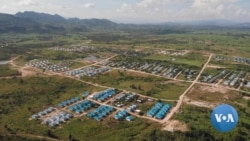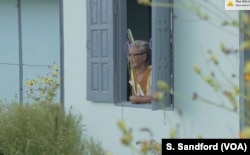ຢູ່ໃນບ້ານຕັ້ງໃໝ່ເລເຄຄໍ ທີ່ຫາກໍ່ສ້າງຂຶ້ນເມື່ອບໍ່ນານມານີ້ ຢູ່ໃນພາກຕາເວັນ
ອອກຂອງມຽນມານັ້ນ ພວກອົບພະຍົບຊາວກະຫລ່ຽງທີ່ກັບຄືນປະເທດ ພວມ
ປະສົບກັບຄວາມຫຍຸ້ງຍາກໃນການປັບຕົວເຂົ້າກັບສະພາບ ພາຍຫລັງທີ່ມີ
ການຂັດແຍ້ງກັນ ແລະໄດ້ຫລົບໜີໄປ ເປັນເວລານານກວ່າ 6 ທົດສະວັດ.
ສະຕີບ ແຊນຟອດ ນັກຂ່າວວີໂອເອໄດ້ລົມກັບຊາວກະຫລ່ຽງທີ່ກັບຄືນປະເທດ
ກ່ຽວກັບຄວາມຫຍຸ້ງຍາກ ທີ່ພວກເຂົາເຈົ້າຈະປະເຊີນ ເພື່ອຈະໄດ້ມີອານາຄົດ
ທີ່ໝັ້ນຄົງ ແລະສະຫງົບສຸກ ຊຶ່ງບົວສະຫວັນ ຈະນຳລາຍລະອຽດກ່ຽວກັບເລື້ອງນີ້
ມາສະເໜີທ່ານໃນອັນດັບຕໍ່ໄປ.
ຢູ່ໃນບ້ານ ເລເຄຄໍ ທີ່ຕັ້ງໃໝ່ນັ້ນ ມີຮ່ອງຮອຍບົ່ງບອກ ຢ່າງຈະແຈ້ງວ່າ ຍັງຕ້ອງມີ
ການພັດທະນາຢ່າງຫລວງຫລາຍ ຢູ່ໃນເສັ້ນທາງການອົບພະຍົບກັບມາຫາຖິ່ນ
ຖານຂອງພວກເຂົາເຈົ້າຄືນ.
ແຕ່ວ່າ ຖະໜົນຫົນທາງຕ່າງໆ ໄປຫາຂົງເຂດນັ້ນ ມັນບໍ່ແມ່ນບັນຫາໃຫຍ່ທີ່ສຸດໃນຂະນະ
ທີ່ພວກຕັ້ງຖິ່ນຖານໃໝ່ ຍັງຂາດສິ່ງທີ່ຕ້ອງການແບບພື້ນຖານຢູ່.
ລຸງຊໍ ປາຕາຢາ, ຜູ້ນຳຂອງຊາວບ້ານເລເຄຄໍເວົ້າວ່າ
"ບັນຫາຕົ້ນຕໍຢູ່ໃນບ້ານນີ້ ດຽວນີ້ ແມ່ນນ້ຳດື່ມ, ນ້ຳໃຊ້. ພວກເຮົາມີບັນຫາທາງ
ລະບົບນ້ຳ ເຊັ່ນ ທໍ່ນ້ຳຮົ່ວ ຫລື ທໍ່ແຕກ."
ເບິ່ງວີດິໂອທີ່ສະແດງໃຫ້ເຫັນຄວາມຫຍຸ້ງຍາກ ຂອງຊາວອົບພະຍົບ ຊາວກະຫລ່ຽງ ໃນບ້ານຕັ້ງໃໝ່
ພວກອົບພະຍົບຈາກລັດກະຫລ່ຽງ ບວກກັບພວກອົບພະຍົບຢູ່ພາຍໃນປະເທດ 3,000
ຄົນ ພາກັນອາໄສຢູ່ໃນເຮືອນທີ່ຖືກໆ. ແຕ່ວ່າ ການຊ່ວຍເຫລືອແກ່ 900 ຄອບຄົວທີ່ໂອ
ກາດ ທີ່ຈະມີວຽກເຮັດງານທຳຢ່າງຈຳກັດນັ້ນແມ່ນເລື້ອງທີ່ໜ້າເປັນຫ່ວງຂອງຫລາຍໆ
ຄົນ,ລວມທັງ ທ້າວ ໂວໂຊ (Woh Soe), ອະດີດອົບພະຍົຍ ທີ່ຫາກໍ່ກັບຄືນມານີ້ອີກ
ດ້ວຍ.
ທ້າວ ໂວໂຊເວົ້າວ່າ "ຢູ່ບ່ອນໜີ້, ມັນເປັນການຍາກທີ່ຈະມີວຽກເຮັດແບບຖາວອນໄດ້.
ວຽກທີ່ມີໃຫ້ເຮັດກໍມີແຕ່ເປັນມື້ໆໄປ. ພວກເຮົາຈະຕ້ອງໄດ້ຊອກຫາວຽກງານຂອງ
ພວກເຮົາເອງ."
ອົບພະຍົຍຫລາຍຄົນເຄີຍເປັນຊາວນາກ່ອນພວກເຂົາເຈົ້າ ຈະກາຍເປັນຜູ້ອົບພະຍົບ
ຫລົບໜີຈາກບ້ານເຮືອນຂອງຕົນໄປ ແລະດຽວນີ້ ຍ້ອນວ່າ ບໍ່ມີດິນໃຫ້ເຮັດນາ ເຂົາເຈົ້າ
ກໍເລີຍເປັນຄົນຫວ່າງງານໄປ.
ປ້າ ນໍ ລາ ກີ, ອະດີດຊາວນາຜູ້ນຶ່ງກ່າວຕໍ່ວີໂອເອວ່າ
"ດຽວນີ້ລູກຊາຍຂອງຂ້ອຍມີວຽກເຮັດຢູ່ ແຕ່ວ່າ ໃນໄລຍະຜ່ານມາ ລາວບໍ່ສາມາດ
ຊອກວຽກໄດ້. ຂ້ອຍມີພີ່ນ້ອງ ທີ່ເປັນລູກປ້າ ລູກລຸງອີກສອງຄົນ ທີ່ຈະມາຕັ້ງຖິ່ນຖານ
ຢູ່ໃນບ້ານນີ້ ໃນໄວໆນີ້ ແຕ່ວ່າ ຂ້ອຍກໍບໍ່ຮູ້ວ່າ ເຂົາເຈົ້າຈະຊອກວຽກຫຍັງເຮັດໄດ້ ຢູ່
ບ່ອນໜີ້. ມັນຈະເປັນບັນຫາຍາກສຳລັບເຂົາເຈົ້າ.”
ໂດຍທີ່ມີການຢຸດຍິງກັນແລ້ວ, ການຍຶດເອົາດິນກຳລັງມີທ່າອ່ຽງເພີ້ມຂຶ້ນເລື້ອຍໆ ແລະໃນ
ການສຶກສາເມື່ອໝໍ່ໆ ມານີ້ ສະແດງໃຫ້ເຫັນວ່າ ພວກນັກທຸລະກິດທີ່ຮູ້ຈັກກັບພວກທະ
ຫານດີ ແມ່ນກວາມເອົາເກືອບຮອດ 50 ເປີເຊັນທີ່ທຳການຢຶດເອົາດິນນັ້ນ.
ທ່ານ ປາດໍ ມານ ບາຕຸນ ເຈົ້າໜ້າທີ່ພະແນກປ່າໄມ້ຂອງລັດກະຫລ່ຽງ ເວົ້າວ່າ
"ກໍຍັງມີນັກລົງທຶນຫລາຍຄົນເຊັ່ນກັນ ລວມທັງ ລັດຖະບານມຽນມານຳ ທີ່ຢາກເຮັດ
ທຸລະກິດຢູ່ໃນຂົງເຂດຂອງພວກເຮົາ ແລະເປີດໂຮງງານຕ່າງໆ. ພວກເພິ່ນເວົ້າວ່າ
ຈະສ້າງວຽກເຮັດງານທຳໃຫ້ແກ່ຄົນໃນທ້ອງຖິ່ນນີ້ ແຕ່ວ່າພວກເຮົາກໍຕ້ອງພິຈາລະ
ນາເບິ່ງວ່າ ຈະຈັດການ ແລະເຮັດໃຫ້ດິນຂອງພວກເຮົາໃຊ້ໄດ້ຜົນສຳລັບທຸກຄົນ
ໄດ້ແນວໃດ."
ໃນຂະນະທີ່ງົບປະມານໃຊ້ຈ່າຍແກ່ສູນອົບພະຍົບ ແລະສະບຽງອາຫານຫລຸດລົງ ຢູ່ຟາກ
ຊາຍແດນເບື້ອງຂອງໄທ, ຄວາມຫວັງທີ່ຈະກັບໄປສູ່ຄວາໝັ້ນຄົງໄດ້ຄືນອີກ ແລະຈະມີອະ
ນາຄົດອັນແນ່ນອນຢູ່ໃນມຽນມານັ້ນ ເປັນເລື້ອງທີ່ຍັງເປັນໄປໄດ້ຍາກຢູ່.
In the recently built resettlement village of Lay Kay Kaw in eastern Myanmar, returning Karen refugees struggle to adjust after more than six decades of conflict and displacement. Steve Sandford spoke with Karen returnees about the challenges that lie ahead for a sustainable - and peaceful future.
In the new village of Lay Kay Kaw, there are clear signs that much development is still needed on the path to repatriation.
But roads to the area aren't the biggest concerns, as new settlers still lack the basics.
Saw Pataya, Lay Kay Kaw Village Leader
"The main problem in the village right now is the water supply. We have trouble with the water system such as a water pipes cracking or breaking down."
A mix of 3,000 Karen State refugees and internally displaced persons live in low-cost houses. But support for the 900 families with limited job opportunities is a concern for many, including former refugee Woh Soe.
Woh Soe, Recent Returnee
"Here, it's hard to get a permanent job. The only available work is day by day. We have to search for our own jobs."
Many of the refugees were farmers before being displaced, and now, without land, they are unemployed.
Naw La Gee, Former Karen Farmer
"Right now my son has a job to do but in the past he could not find any work. I have two more cousins that are going to resettle in this village soon but I don't know what jobs they can find here. It's going to be hard for them."
With a cease-fire in place, land grabs are rising and a recent study shows that military-connected businesses account for nearly 50% of them.
Padoh Mahn Batun, Karen Forestry Department
"There are also many investors, including the Myanmar government who want to do business in our area and open factories.They say they will create more jobs for locals but we have to consider know how to manage and make our land work for everyone."
As refugee camp budgets and food supplies shrink on the Thai side of the border, the prospect of returning to a secure and sustainable future in Myanmar remains in question.







